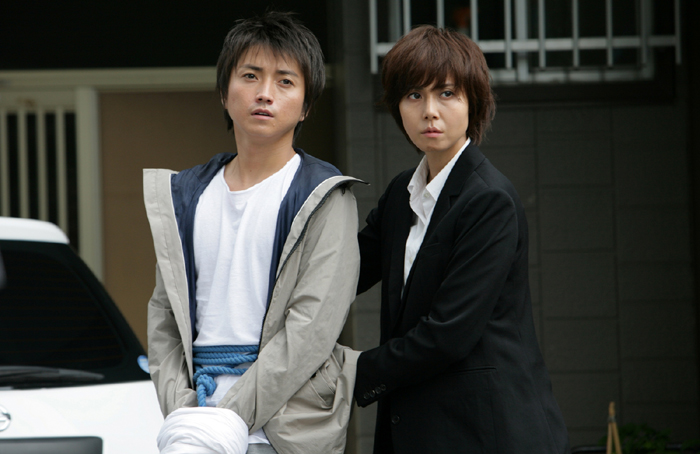 Criminal Kunihide Kiyomaru (Tatsuya Fujiwara) is guarded by detective Atsuko Shiraiwa (Nanako Matsushima) in SHIELD OF STRAW, one of the new Takashi Miike films screened at Sitges. Photo courtesy of Warner Bros. Pictures Japan. © Kazuhiro Kiuchi/Kodansha © 2013
Criminal Kunihide Kiyomaru (Tatsuya Fujiwara) is guarded by detective Atsuko Shiraiwa (Nanako Matsushima) in SHIELD OF STRAW, one of the new Takashi Miike films screened at Sitges. Photo courtesy of Warner Bros. Pictures Japan. © Kazuhiro Kiuchi/Kodansha © 2013 Source: Sitges – International Fantastic Film Festival of Catalonia press release Official Site: sitgesfilmfestival.com Prolific director Takashi Miike, a leading figure that has a special connection with the upcoming Sitges – International Fantastic Film Festival of Catalonia (Barcelona, Spain), returned to the festival for screenings of his latest works.
Arriving from Japan on October 18th, Miike attended screenings of LESSON OF THE EVIL (????, Aku no Kyoten, 2012) and SHIELD OF STRAW (???, Wara no Tate, 2013), presented in collaboration with the Japan Foundation. The director was welcomed with a standing ovation in the master class he offered at the Festival and where the book dedicated to him by the Festival was also presented. The prolific Japanese filmmaker Takashi Miike said that he felt truly moved by his welcome at the Festival. The session also was put to good use to present the book Sitges dedicated to him this year. The director receives the Festival’s honorary award and, in addition to SHIELD OF STRAW and LESSON OF THE EVIL, a retrospective of his works AUDITION (???????, Odishon, 1999), CITY OF LOST SOULS (???, Hyooryuu-gai, 2000) and SHANGRI-LA (???????????????, Kin`yu hametsu Nippon: Togenkyo no hito-bito, 2002) was shown. The Japanese filmmaker jokingly said that because of this event, now “the Takashi Miike brand would be linked to violence and blood”. Festival director Àngel Sala described Takashi Miike as the director that has screened the most movies in Sitges, and considers him to be the most acknowledged filmmaker on the rich contemporary Japanese scene. He also expressed the Festival team’s adoration for the director’s work, the motive for the honorary award he receives October 19th. At this event, the book, coordinated by Àngel Sala and Desirée de Fez, that the Festival published on the occasion of the tribute to the director and the retrospective of his work, was also presented. Critic and programmer de Fez insisted on the Japanese director’s creative freedom and, for this reason, they also allowed the authors of the book their freedom, offering contradictory views of Takashi Miike’s work.



